Circus From Within– Marco Motta, Winner of the CircusTalk Critic’s Choice Award

When Marco Motta was a little boy growing up in Salvador, Bahia in Brazil, he lived a happy life, which he attributes to the efforts of his mother. Although he describes the area he grew up in as dangerous and violent, he was surrounded by dancing, art, and African rhythms. This instilled a lifelong love of art in him and perhaps sustained him when he hit puberty and things changed. That’s when he became aware of the problems of poverty and racism rampant in the marginalized populations surrounding him, and lost several friends to the violence. He found breakdancing and that was his solace and main form of artistic expression which eventually led him to other forms of dance and ultimately to circus, which Motta considers the perfect palette for his message about the need for social change.
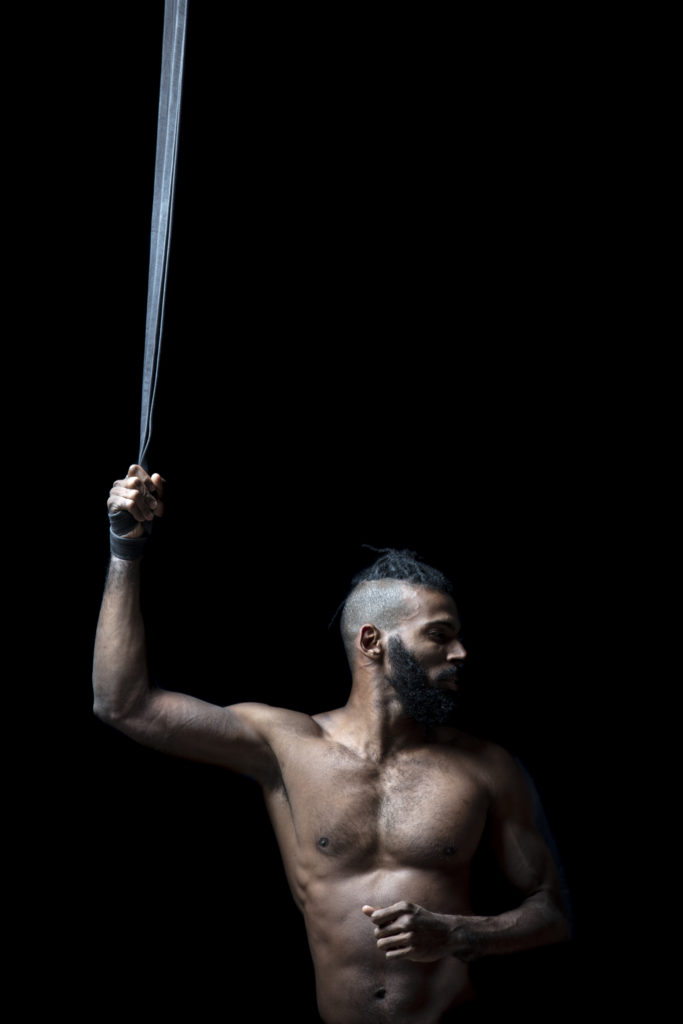 I first encountered Marco Motta at the 2019 FIRCO Festival where he competed while I was on the jury. On the night of his act, as he hung from two straps and the song Strange Fruit by Billie Holiday began, it felt as if the entire audience held its breath. Whether it was surprise at the song choice or shock at how Motta evoked so much emotion by rolling and flipping poetically up and down the vertical cloth, dislocating his shoulder on purpose, sometimes hanging or swaying, and hoisting himself higher, I wasn’t sure. I only knew he chose a powerful song rife with innuendo about the inhuman injustice of lynchings to go with his equally powerful and dramaturgically tragic act. Motta won two awards at the festival, Bronze from FIRCO jury itself, and the CircusTalk Critic’s Choice award which we inaugurated this year at the FIRCO festival. One of our objectives was to include in the criteria of an artistic award a feature that considers the artistry and technique of an act or show but also takes into account the social relevance of the performance. As part of the award, it was decided that the winner would also receive an article on CircusTalk about their work, which brought Motta and I together for a discussion about this 28-year-old’s life and mission.
I first encountered Marco Motta at the 2019 FIRCO Festival where he competed while I was on the jury. On the night of his act, as he hung from two straps and the song Strange Fruit by Billie Holiday began, it felt as if the entire audience held its breath. Whether it was surprise at the song choice or shock at how Motta evoked so much emotion by rolling and flipping poetically up and down the vertical cloth, dislocating his shoulder on purpose, sometimes hanging or swaying, and hoisting himself higher, I wasn’t sure. I only knew he chose a powerful song rife with innuendo about the inhuman injustice of lynchings to go with his equally powerful and dramaturgically tragic act. Motta won two awards at the festival, Bronze from FIRCO jury itself, and the CircusTalk Critic’s Choice award which we inaugurated this year at the FIRCO festival. One of our objectives was to include in the criteria of an artistic award a feature that considers the artistry and technique of an act or show but also takes into account the social relevance of the performance. As part of the award, it was decided that the winner would also receive an article on CircusTalk about their work, which brought Motta and I together for a discussion about this 28-year-old’s life and mission.
Kim Campbell: How did you first get interested in breakdancing and then circus?
Marco Motta: I started breakdancing in my city in Brazil. And then I started to do some capoeira and afro dance, and all of that. So all my life I really loved to dance. I started dancing there and I came to Madrid and I found it really hard over here, but I started working on a circus show but as a dancer. In the show, I had a really good friend who did the straps and they showed me circus in a different light. Because in my mind, I imagined circus like years ago, with everyone with animals and these costumes, and a lot of lights, and I thought I didn’t like circus. But really, I didn’t know anything about circus and at that moment my friend opened my mind up by showing me contemporary circus.
KC: What did contemporary circus provide you that dance didn’t?
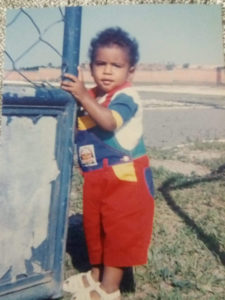
MM: I did this kind of breakdance called abstract breakdance. And I competed because competing in breakdance is very important. In order to be a professional, you need to win a lot of competitions. So I never won because I did abstract breakdance and people would say, “Ah, this is not breakdancing. This is a circus. Get out of here!” and things like that, because I did contortion and strange things. I didn’t feel free because when you need to win the competitions you need to do some specific movements, like for your routine you need to prepare to compete, not to prepare yourself to feel good when you dance. So when I got to circus, I just thought about my artistic freedom, like–here in circus, maybe I can use my creativity to do something really interesting for people.
KC: I could see how circus gave you a lot more creative freedom. So when you were a little kid, what did you dream about becoming when you grew up?
MM: When I was a child, I really loved art in general in my life. And when I try just thinking about it (now, it’s the same)– I love painting and I am at the house of my best friend and he’s a huge painter. But I’m definitely not a good painter. When I was a teenager, I started to dance and it changed my mind because I really felt like I could succeed at it–and this was how my interest started growing.
KC: You found the right form of expression for you and for your talents. You said you started straps about five or six years ago. Did your dance background help you on straps?
MM: Yeah, definitely. Dance helped me a lot because when you are part of the hip hop culture, you need to bring something different to your community. You need to innovate and not do the same thing as everyone else for years. So when I started circus, I had this hip hop or b-boying mentality–to change the game, to do something new. So when I start to do circus, my brain was working differently since I first started in dance and after in circus. In circus (it seems) everyone does gymnastics then goes directly to circus school. I think this has helped me a lot to develop my style.
KC: You told me before that you had some reactions from people who were protective of the art, who’d said that since you didn’t go to school for circus, you shouldn’t be doing it. What did that feel like?
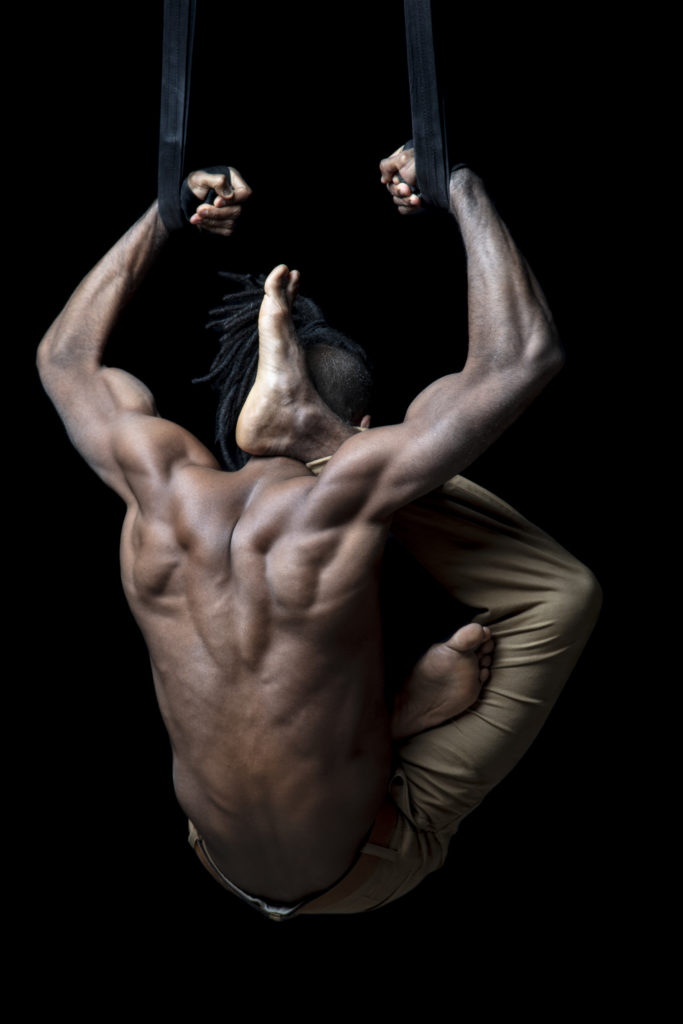 MM: So this has happened a lot with directors or people from the older generation. But because of the new generation, I have real good friends and everyone says, ‘Ah, this is super cool.’ But for the people who are more classic in mind–not just classic in the circus way–but the classical mindset, they always say to me, ‘Yeah, you are working really well, but try to change this or that because you need more technique.’ And I say to these people, ‘Okay, wait a minute. I’ve done this for six years and I don’t have any injuries. I feel good about what I’m doing. So what kind of technique do you mean? Aesthetic? Because aesthetics sometimes is really subjective.’ It’s like painting! You can paint realism or abstract, but you never compare the two. For example, comparing Goya with Michelangelo and say ‘Who is the best?’ I don’t know who is the best! It’s not a big question about technique. Yeah, I have technique, I have a capoeira technique. I have breakdance technique. I danced for ten years and I don’t have any injury in my shoulders or my knees or my elbows. I really think it’s just that I have a different technique because I come from a different place. I have a different culture. So I think diversity is really important. And there are always people who really don’t like my work because I don’t straighten my legs or point my feet.
MM: So this has happened a lot with directors or people from the older generation. But because of the new generation, I have real good friends and everyone says, ‘Ah, this is super cool.’ But for the people who are more classic in mind–not just classic in the circus way–but the classical mindset, they always say to me, ‘Yeah, you are working really well, but try to change this or that because you need more technique.’ And I say to these people, ‘Okay, wait a minute. I’ve done this for six years and I don’t have any injuries. I feel good about what I’m doing. So what kind of technique do you mean? Aesthetic? Because aesthetics sometimes is really subjective.’ It’s like painting! You can paint realism or abstract, but you never compare the two. For example, comparing Goya with Michelangelo and say ‘Who is the best?’ I don’t know who is the best! It’s not a big question about technique. Yeah, I have technique, I have a capoeira technique. I have breakdance technique. I danced for ten years and I don’t have any injury in my shoulders or my knees or my elbows. I really think it’s just that I have a different technique because I come from a different place. I have a different culture. So I think diversity is really important. And there are always people who really don’t like my work because I don’t straighten my legs or point my feet.
KC: What has the circus world’s reaction been to you in general?
MM: The public really likes my work. But my problem is always the big companies or the directors and patrons. And it’s because I’m really strange, so to put me in the show is like ‘Where do I put this guy?’ But because the circus goes toward the new generation, they see people from the new generation like my work. But I (still) don’t have too much work.
KC: So let’s talk about your act. You know, you chose the song Strange Fruit, which was immediately heart wrenching for me, being an American. I’m sure not everybody knows the history of that song and what it means. But your act is very emotional and moving. Can you talk about the inspiration for your act and what the message of it means to you?
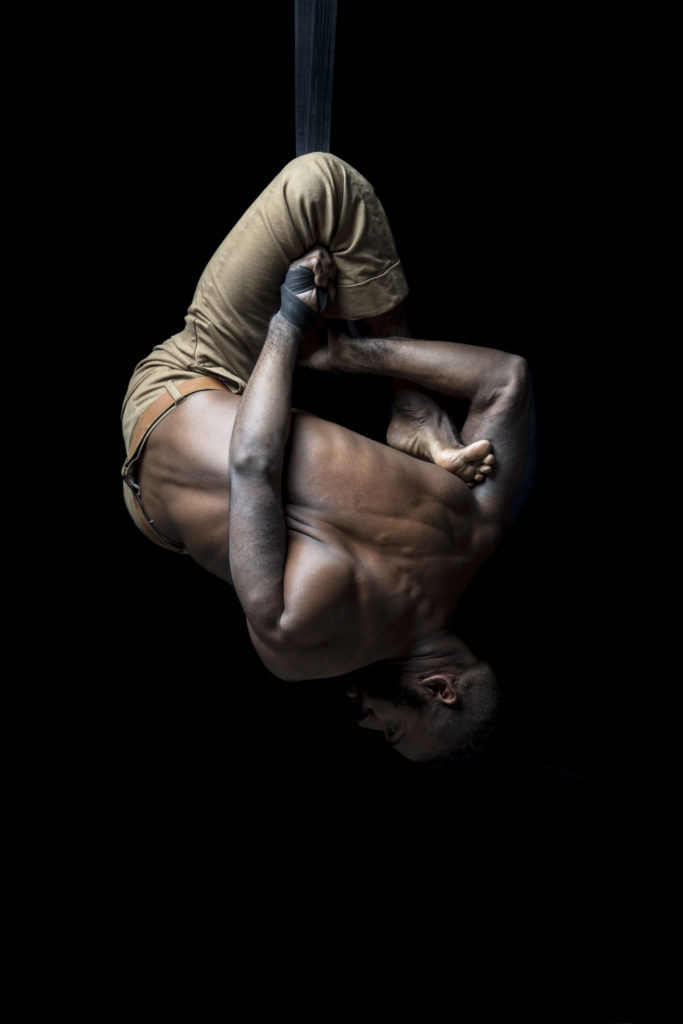 MM: Yeah, so this music is the most important music of the 20th century for me. I think I speak about the American truth. All America– like South America, and Central America. I’m descended from slaves, so I really know what happens and I have suffered a lot of racism in my country. I suffer over here too in Spain and I’ve gone to jail over here just because I’m illegal. So I’m human and I just try to be alive because in my country, the police shoot you just because you’re black. I lost like five friends in the last 10 years and a lot of friends before. So it’s survival. I just try to survive, and because of that, I came to Europe with my mother. And for me this act speaks about my truth. I don’t have any outside inspiration. I am just thinking about how I feel when the police stop me and take me to jail or when I try to find some work and the people don’t give me work just because I’m black. It is a really stupid thing. We are in 2019. And this for me is unreal.
MM: Yeah, so this music is the most important music of the 20th century for me. I think I speak about the American truth. All America– like South America, and Central America. I’m descended from slaves, so I really know what happens and I have suffered a lot of racism in my country. I suffer over here too in Spain and I’ve gone to jail over here just because I’m illegal. So I’m human and I just try to be alive because in my country, the police shoot you just because you’re black. I lost like five friends in the last 10 years and a lot of friends before. So it’s survival. I just try to survive, and because of that, I came to Europe with my mother. And for me this act speaks about my truth. I don’t have any outside inspiration. I am just thinking about how I feel when the police stop me and take me to jail or when I try to find some work and the people don’t give me work just because I’m black. It is a really stupid thing. We are in 2019. And this for me is unreal.
I really think all the world has a huge problem with racism and I don’t understand why, because I’m intelligent. I’m normal. I’m a person, and that I try to put this on the stage. I like to speak about my feelings and how I can’t really feel free. I’m not free. I’m not a free man. My ancestors were fighting to give me freedom and I don’t feel free because my passport is shit. A lot of employers say to me. ‘No, you need a European passport.’ And I say ‘Sorry, but I don’t have it. But I really would like to work!’, and they say ‘No, sorry, we can’t.’ I don’t understand why there are so many problems with these companies to do the visas. But, this is not freedom. I’m still like my ancestors, without chains on the hands and the feet, but I can ‘t feel free. So in my act, I put these (chains) outside like, ‘Look, I’m not a free man. And I really would like to change these things.’
KC: Marco, thank you for sharing that. You’ve experienced a lot of racism in different places that you’ve been and then also there is the visa issue. Do you think that this is an issue for all circus artists who are traveling from country to country, that if they’re not from the European Union, they come across difficulties getting work visas? Or do you think it’s particularly because you’re from Brazil or because you’re black or a combination of all of those things?
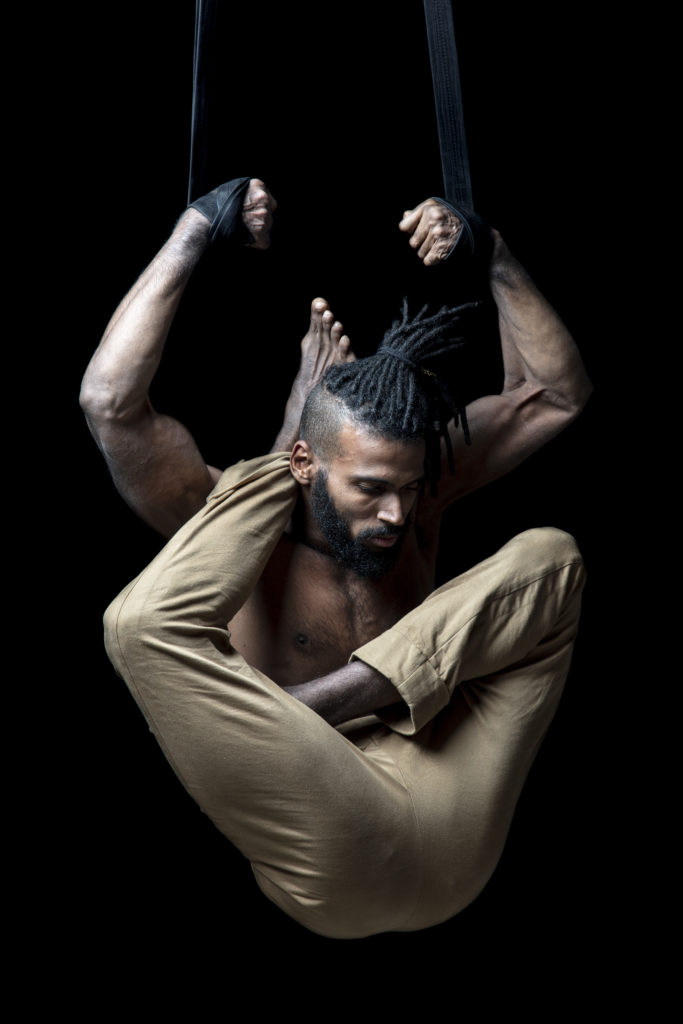 MM: I don’t think it’s just because I’m black. This is a problem of white supremacy. If you are European, you don’t have any problems (traveling) around the world and you feel free and you can go to Indonesia, Canada, or wherever you want. But if you’re Asian or Palestinian or Latin American, Cubans or Venezuelans–you have a lot of problems. We have huge problems getting a travel visa. It is not a problem just for black people. I speak about black people because I’m black. So I know what happens. It’s racial profiling.
MM: I don’t think it’s just because I’m black. This is a problem of white supremacy. If you are European, you don’t have any problems (traveling) around the world and you feel free and you can go to Indonesia, Canada, or wherever you want. But if you’re Asian or Palestinian or Latin American, Cubans or Venezuelans–you have a lot of problems. We have huge problems getting a travel visa. It is not a problem just for black people. I speak about black people because I’m black. So I know what happens. It’s racial profiling.
KC: I think that’s interesting because one of the criteria for this award is a component about social relevance. We wanted to recognize when acts or shows work to provoke a response from people, to ask them to examine the world a little more closely and their role within it. And I think you do that with your work and I think that’s what makes you a great artist.
MM: Yeah, thank you. It’s what I try to do, you know. For me, the artist is the most important thing in the world to change minds. This happens in music. For example, Bob Marley changed his country. He left the country because the police threatened to kill him because they considered him a revolutionary. Or Billie Holiday or Nina Simone, they really changed minds with their music and I try to do the same with my art. I’m not a musician, I’m not a painter. I’m a circus artist. I just have this window to fight in this war.
This is what I tried to do because racism is everywhere. Racism happens in the circus company or everywhere I go. For example, when companies pay Chinese or Latin American artists less…This is really happening and it’s not cool. I would like to work with a company, but pay me like you pay the Canadians or the Europeans. This is an important change we need… in the circus world this has happened a lot and everyone talks about it. Why do you pay the Ukranian or Chinese or Latin American artists less? They have quality acts and you pay less. For me, it’s disgusting. And I really try to speak about them with my act –there’s a lot of themes, but I put everything out.
I’m not a musician, I’m not a painter. I’m a circus artist. I just have this window to fight in this war.
KC: So what advice would you give to emerging artists interested in applying for and performing at festivals like FIRCO, for example?
MM: I’d just say prepare yourself, relax and never ever think about the judges…No, just do what are you feeling or do what you really like to do. It’s your work. You do this all your life, you’re training hard. So just really relax, trust yourself. Go over there open, to show what you need to show. Don’t think about the people. Enjoy! In FIRCO I really enjoyed myself, and at Cirque de Demain too. For me, it’s just a huge party and a chance to meet people from around the world and other cultures because I really trust in what I do. So I just say that–trust in yourself!
KC: What are your plans moving forward? What are your hopes and dreams for 2020?
MM: In the next year, it’s very important that I try to find work and I have a personal project too. In the show, we will speak about illegal immigration and African culture and the diaspora in Latin America and everything like that. So, a personal show about 40 minutes long, and I am trying to find funding to do it. I would really like to put African and Aboriginal and Native American music on stage and to do circus and afro dance and mix everything with jazz. That is how I would like to close this year, by finding funding help from the government to do it. I am really interested in doing these political things now, and in finding work and to never stop doing circus. This is really important…moving forward.
All photos courtesy of Marco Motta. Feature photo credit and recent: Sergio Martez
Editor's Note: At StageLync, an international platform for the performing arts, we celebrate the diversity of our writers' backgrounds. We recognize and support their choice to use either American or British English in their articles, respecting their individual preferences and origins. This policy allows us to embrace a wide range of linguistic expressions, enriching our content and reflecting the global nature of our community.
🎧 Join us on the StageLync Podcast for inspiring stories from the world of performing arts! Tune in to hear from the creative minds who bring magic to life, both onstage and behind the scenes. 🎙️ 👉 Listen now!
